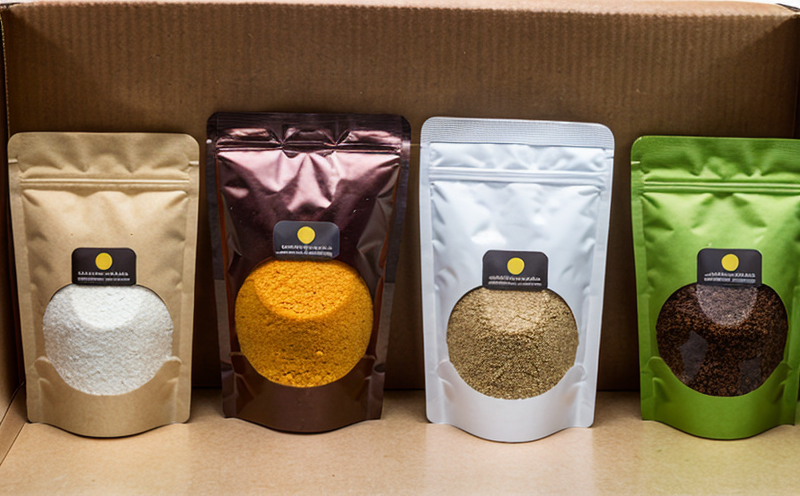Styrene Migration Testing in Polystyrene Packaging
The migration of styrene from polystyrene packaging into food products is a critical concern for consumer safety and regulatory compliance. Styrene, a chemical compound with the molecular formula C8H8, can leach into foods during storage and consumption, potentially exposing consumers to harmful levels if not properly managed.
The process of migration involves several factors such as temperature, humidity, and the nature of the food itself. Polystyrene is commonly used in single-use containers for hot or cold beverages, disposable plates, and cutlery. The thermal stability of polystyrene under varying conditions can influence styrene release rates. For instance, higher temperatures accelerate migration, making it crucial to establish safe usage guidelines.
Regulatory bodies such as the U.S. Food and Drug Administration (FDA) have established limits on the allowable levels of styrene in food contact materials. The FDA's Code of Federal Regulations Title 21, Part 175.300 specifies conditions under which polystyrene containers are allowed for use with food. Compliance is essential to avoid legal penalties and consumer trust issues.
Testing methods for detecting styrene migration include headspace analysis, extraction tests using solvents like ethanol or methanol, and chromatographic techniques such as gas chromatography-mass spectrometry (GC-MS). These methods are designed to quantify the amount of styrene that has migrated into the food product over time. Proper sample preparation is critical; this involves ensuring that the packaging material and food simulants are representative of real-world conditions.
Instrumentation used in these tests includes high-performance liquid chromatographs (HPLC) equipped with appropriate detectors, such as flame ionization detectors for styrene detection. The accuracy and precision of these instruments directly impact the reliability of test results. Quality control measures must also be implemented to ensure consistent testing outcomes.
The importance of this testing cannot be overstated. It helps manufacturers ensure that their products meet stringent safety standards, thereby protecting public health. By conducting thorough migration tests, companies can identify potential risks early in the product development process and implement necessary changes to formulations or packaging designs.
Why It Matters
The issue of styrene migration from polystyrene packaging into food is significant not only for consumer safety but also for brand reputation. Consumers are increasingly aware of the potential health risks associated with chemical exposure, especially through daily consumption items. Regulatory scrutiny has intensified, leading to more rigorous testing requirements.
- Regulatory Compliance: Failure to comply with regulatory standards can lead to product recalls and significant financial losses.
- Brand Reputation: Non-compliance may damage brand image and customer trust.
- Potential Health Risks: Persistent exposure to styrene has been linked to various health issues, including neurological disorders. Ensuring low migration levels is crucial for maintaining public confidence in food safety.
In addition to these immediate concerns, there are long-term implications of non-compliance. A single incident can have far-reaching effects on brand loyalty and market share. Therefore, proactive measures such as robust testing protocols are imperative.
Moreover, the demand for sustainable packaging solutions is growing. Understanding how chemical compounds like styrene behave in different environments allows manufacturers to innovate safer alternatives while adhering to environmental sustainability goals.
Eurolab Advantages
At Eurolab, we offer comprehensive services tailored specifically for the testing of styrene migration in polystyrene packaging. Our expertise lies in providing accurate and reliable results that meet international standards.
- ISO/IEC 17025 Accreditation: Ensures our laboratory meets stringent quality management requirements, guaranteeing the highest level of accuracy and precision.
- Experienced Staff: Our team comprises experts in chemical analysis with extensive experience in food contact material testing.
- State-of-the-Art Facilities: Equipped with advanced instrumentation including HPLC systems capable of detecting trace amounts of styrene, ensuring precise measurements.
- Rapid Turnaround Times: We understand the importance of timely results and strive to deliver quick turnaround times without compromising on quality.
We offer a full range of testing services that go beyond just basic compliance checks. Our comprehensive approach includes detailed reports, recommendations for improvement based on test findings, and consultation on alternative materials or design changes if required.
Our commitment to excellence is reflected in our dedication to staying updated with the latest developments in technology and regulatory requirements. By partnering with Eurolab, you can trust that your products will not only pass current regulations but also meet future demands as they evolve.
International Acceptance and Recognition
- United States: The U.S. FDA has set specific limits for styrene in food contact materials, particularly polystyrene containers. Compliance with these standards is mandatory to avoid legal issues.
- European Union: EU regulations mandate that all food packaging must be safe and non-toxic, which includes controlling the migration of chemicals like styrene. Products labeled for sale within the EU must comply with these stringent requirements.
- China: The Chinese National Standards specify permissible levels of styrene in various types of packaging materials used for food. Adherence to these standards ensures market access and avoids potential export restrictions.
The global nature of trade means that manufacturers must adhere to multiple sets of regulations, making it essential to work with a laboratory that understands these varied requirements and can provide consistent results across different geographies.
Our clients benefit from our extensive network allowing us to offer localized testing services in various parts of the world. This ensures that regardless of where your product is intended for sale, you receive accurate data based on local regulatory expectations.





